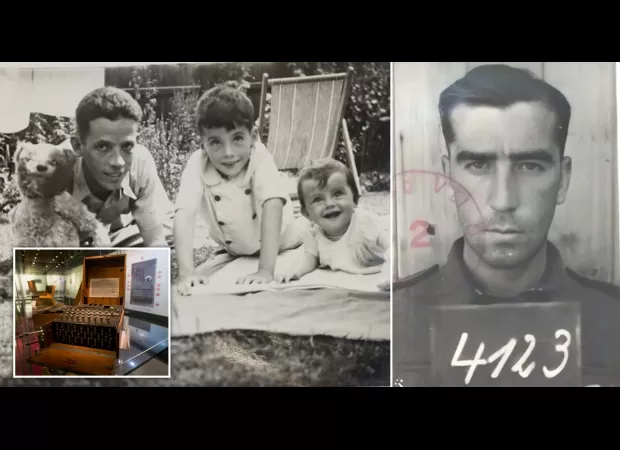The hidden stories of the people at Bletchley Park and their mission to find U-boats have now been uncovered.
Albert Gorman, a Bletchley worker, is finally having his story heard.

The University of Oxford is leading a digital history project to preserve untold stories and family heirlooms from World War Two. Through the 'Their Finest Hour' project, the university is gathering memories and artefacts from the Nazi era, to be shared with the world on Remembrance weekend.
One of the contributions to the online archive is a set of photographs of Albert William Gorman, a worker at top-secret Bletchley Park. Albert worked in the German Section as a temporary senior administrative officer, yet despite the high-stakes nature of his work, he still found time to relax with friends and family. One of the black-and-white photographs shows Albert grinning, with a chimpanzee's hand on his shoulder. Albert's granddaughter donated the pictures to the project out of a desire for her grandfather to be recognised for his contributions to the war effort.
Another image shows Petty Officer Norman Rose, who was involved in the capture of an intact Enigma machine from a stricken German U-boat while he was serving on the HMS Bulldog. The encryption device was found complete with the cipher keys and code books valid for the next three months. The rare capture and boarding of one of the submarines took place south of Iceland on May 9, 1941, and the machine and code books were taken to Scotland by the Bulldog, before being transferred to Bletchley Park and Hut 8. The codebreakers, including Alan Turing, were then able to decipher coded messages, which saved many merchant ships and lives in the following months.
The contributions to the project have come from families all over the country, and include diaries, letters, journals, and photographs. One of the images shows John Parrish, a Canadian soldier who was taken prisoner during the disastrous Operation Jubilee in August 1942. He spent 971 days as a prisoner of war after being captured by the Germans on a beach in Dieppe, Normandy. His granddaughter donated his story to the project as a way of preserving his memory, along with the memory of all those who served in the war.
The project is funded by the National Lottery Heritage Fund and will be free to use from June 2024. Project leader Dr Stuart Lee said: ‘We’re delighted to be able to create an archive of memories of the Second World War era. Our aim is to empower people to digitally preserve these stories and objects before they are lost to posterity.’
As Remembrance weekend takes place to remember all who served, this project is a way to create a lasting collection of memories and artefacts from the war. Dr Lee said: ‘Remembrance Weekend is especially poignant this year because not only does November 11 fall on a Saturday, so the two-minute silence immediately precedes the ceremonies at the Cenotaph, but we are mid-way through the 80th anniversary of World War Two when in 1943 the tide turned against the Axis powers. With Their Finest Hour we are asking members of the public to share stories, memories and objects about not only those who served but also those across the Commonwealth who supported Britain’s war effort.’
For those who have a story or item they wish to share, please contact josh.email. By contributing to the 'Their Finest Hour' project, we can ensure that the memories of those who served in World War Two are preserved, and never forgotten.






